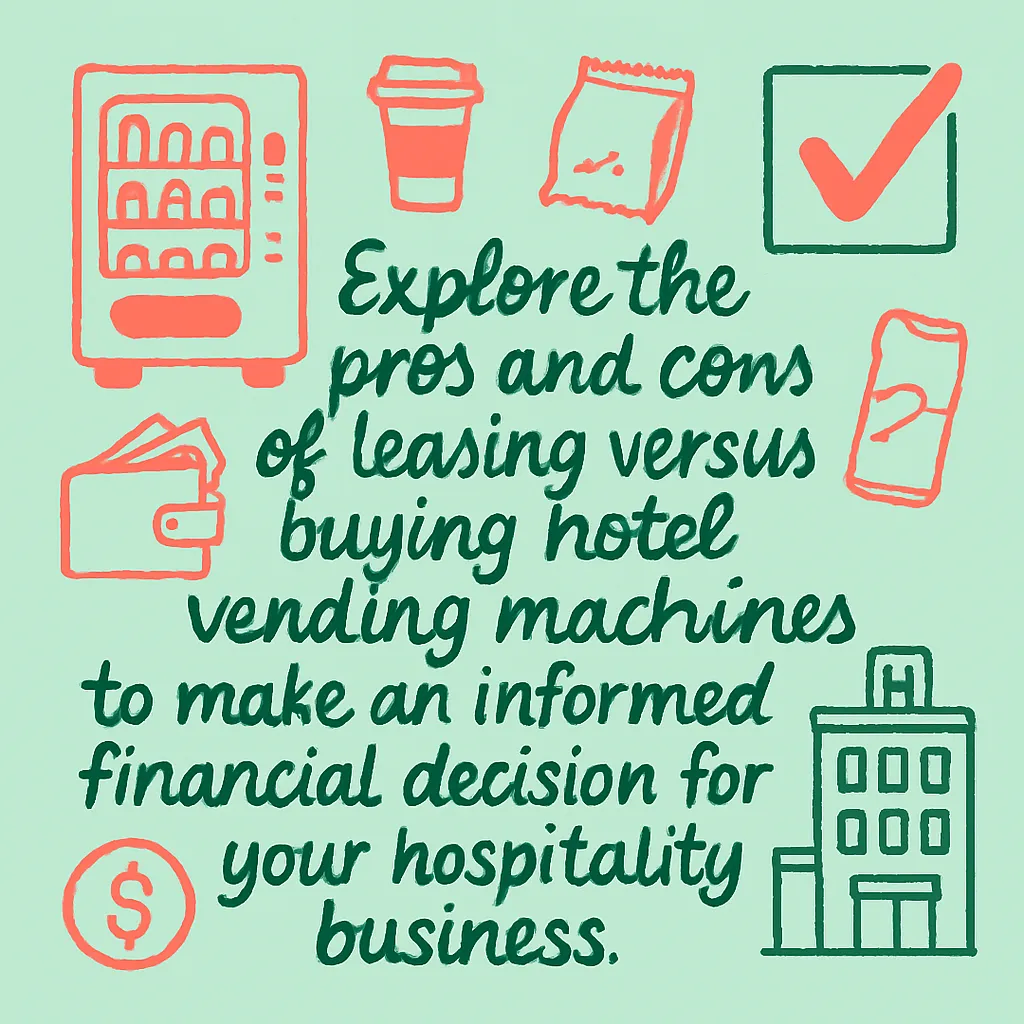Hotel Vending Machine Leasing vs Buying: A Strategic Decision
Explore the pros and cons of leasing versus buying hotel vending machines to make an informed financial decision for your hospitality business.
Back to Vending for Hotels ResourcesExplore the pros and cons of leasing versus buying hotel vending machines to make an informed financial decision for your hospitality business.
Back to Vending for Hotels ResourcesDeciding between leasing and buying vending machines for your hotel involves considering financial flexibility, operational control, and long-term goals. Each approach offers distinct advantages for hospitality businesses.
![]() Leasing offers lower upfront costs and easier upgrades to new technology
Leasing offers lower upfront costs and easier upgrades to new technology
![]() Buying provides full ownership, potential for greater profits, and tax benefits
Buying provides full ownership, potential for greater profits, and tax benefits
![]() Evaluate your hotel's financial health and strategic vision to make the best choice
Evaluate your hotel's financial health and strategic vision to make the best choice

For hotel owners and operators, enhancing guest convenience and potentially generating additional revenue are always top priorities. Vending machines represent a valuable amenity, but the financial decision of whether to lease or buy them can significantly impact your bottom line. Each option comes with its own set of benefits and considerations, making a careful evaluation essential for optimal strategy.
Leasing vending machines for your hotel provides considerable financial flexibility. It typically involves lower upfront costs, freeing up capital that can be allocated to other essential hotel operations or renovations. Monthly lease payments are predictable, simplifying budgeting and financial forecasting. For hotels that prefer to stay current with technology, leasing offers the advantage of easier upgrades, allowing you to regularly offer guests the latest in interactive features and cashless payment options without the burden of selling outdated equipment. It's an excellent way to test the demand for vending services without a major long-term commitment. Many lease agreements also include comprehensive maintenance and repair services, which reduces the operational burden on hotel staff.
On the other hand, buying vending machines offers hotels full ownership and long-term control. While the initial investment is higher, purchasing machines can lead to greater profitability over time as you retain all sales revenue (after product costs) rather than making ongoing lease payments. Ownership also provides tax benefits through depreciation deductions, which can reduce your hotel's taxable income. You'll have complete autonomy over product selection, pricing, and machine customization, allowing you to tailor offerings precisely to your guest demographic and brand aesthetic. This level of control can be particularly appealing for hotels looking to integrate vending seamlessly into their overall guest experience. Explore our guide on cost of vending services for hotels for a deeper dive into financial aspects.
Several factors should influence your decision. Your hotel's current capital availability is crucial; if conserving cash is a priority, leasing might be more suitable. Consider your long-term plans for the machines; if you anticipate frequent upgrades or foresee selling the hotel within a few years, leasing offers more agility. The expected lifespan and reliability of the machines are also important. Modern machines are durable, but technology evolves quickly. For insights into selecting machines that stand the test of time, you can also review how to make an informed choice with buying vs leasing vending machines in general.
Maintenance and servicing are often significant differentiators. With a lease, these are usually covered by the provider, ensuring minimal disruption. If you buy, you're responsible for all upkeep, unless you arrange for a separate service contract. This decision also impacts how quickly issues are resolved and how regularly machines are restocked. Understanding who fills and maintains vending machines is key to a smooth operation, so learning more about who fills and restocks vending machines can help hotels plan accordingly.
Ultimately, the choice between leasing and buying depends on your hotel's unique financial situation, operational preferences, and strategic goals. Both options can successfully integrate vending amenities into your guest services, offering convenience and potentially boosting revenue. A thorough analysis will ensure you select the path that best supports your hotel's continued success.
Leasing typically involves lower upfront costs and predictable monthly payments, while buying requires a significant initial investment but builds equity.
Leasing is ideal for hotels looking to conserve capital, upgrade frequently, or test demand without a long-term commitment.
Buying offers full ownership, potential for higher long-term profits, tax depreciation benefits, and complete control over machine operations and product selection.
Lease agreements often include maintenance and repair services, whereas buyers are responsible for all servicing unless they opt for a full-service vending agreement.
Customization options depend on the lease agreement. Some lessors allow branding, while others may have restrictions.
At the end of a lease, hotels typically have options to return the machine, renew the lease, or purchase the machine at its residual value.
Lease payments can often be expensed, reducing taxable income. Buying allows for depreciation deductions over the machine's useful life.
Leasing allows hotels to more easily upgrade to newer models with advanced features, while buying means a longer commitment to existing technology.
Lease terms can vary but often range from 24 to 60 months, depending on the machine type and provider.
Hotels should analyze their budget, expected usage, desired flexibility, long-term financial goals, and preferred level of operational control.